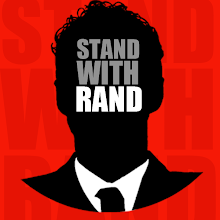I have pretty much ignored the smear campaign many press outlets have been running against Ron Paul. The Christian Science Monitor, though, has been very supportive of Dr. Paul throughout the campaign, so I decided to read this article. I think it makes some good points.
While I don't agree with every point the article makes, one point I particularly agree with is that Dr. Paul needs to not just disavow the newsletters and their racist content, as he has already done, but "disavow them with emotion, emphasizing that he recognizes how hateful they sound today." Anyone truly familiar with Ron Paul knows that he absolutely despises any kind of stereotyping or racism. As I've noted before, the President of a regional branch of the NAACP addressed those newsletters and explained that he knew that Ron Paul is not racist. The kind of collectivist ideals that are at the root of racism run completely contrary to Dr. Paul's political philosophy and personal moral philosophy. While I understand that he has adequately explained the newsletters for his supporters, he has to understand that people who aren't as familiar with him might not be as willing to accept the explanation. The fact is that major news outlets are not going to accept his current explanation, and the negative press will continue. At this point, it hasn't really hurt him, but it could. If his explanation was enough to stifle the criticism in the press, that would be one thing. But it is not. I know that language, like the language in the newsletter, likely disgusts Dr. Paul, and he needs to tell people that.
What Dr. Paul has done thus far is to simply repeated what he's said for years (and what the truth is): He didn't write the newsletters, others did. He doesn't approve of the language or ideals. He is not racist. And he disavows all the racist, bigoted ideas in the newsletters. And Dr. Paul's record and beliefs reflect that he believes in total equality. He does not believe that the federal government should make homosexual marriage illegal, nor does he support a constitutional amendment that would do that. He believes that drug laws and capital punishment disproportionately targets minorities. While he does believe in closed borders, he does not have the kind of negative feelings toward illegal immigrants that many in the GOP express. He has to take another step, though, to show people that, though the letters represent bad management of a business carrying his name, those newsletters do not at all represent his personal views. And let me say here that I don't think that the fact that Ron Paul mismanaged the newsletters is any kind of argument against his fitness to lead as President. In regards to leadership and management skills, it is no more an issue than Mitt Romney, more than once, hiring landscapers that employed illegal immigrants.
Sorry for the digression. But, as I said, Ron Paul needs to go a step further in regards to addressing these newsletters. I have tinkered with the idea that Dr. Paul needs to reveal who actually wrote the offending pieces. Upon further reflection, though, I don't think that would place Dr. Paul in the best light. What he needs to do is have a heart to heart conversation with the people who wrote the material, or who were in charge of the people writing the material, and suggest that they need to make a public statement as to Dr. Paul's role (or the lack there of) in the writing of the newsletters. I would assume that these people want Dr. Paul to be President. They wrote very inflammatory, racist things. There is no doubt about that. I would hope that they'd be willing to sacrifice a little bit of their reputation for the cause of Ron Paul's campaign, especially given the fact that they did, indeed, write these terrible things.
The easiest thing is for Ron Paul to appear on national TV, or make an otherwise-very-public address, wherein he passionately and emotionally disavows and condemns racism in all forms, including the kind of racism in those articles. Whether or not the actual author comes for, this type of address is absolutely essential. And this would actually be a good time for him to make some of his very-valid points about the impact that racism has in our criminal justice system. He can turn this into a positive if he plays it correctly. The problem is that Ron Paul is not a politician at heart. And he isn't going to do something for political gain. So if he believes he has done all he needs to do, the fact that doing more might help his campaign may not be an option. He knows this is ultimately irrelevant and he wants to stay on point. I am hopeful, though, that he will be able to take what the press is throwing at him and use it to make a comment on the damaging effects of racism in our society today. And I think if he does something similar to what I've suggested, he will be able to take the media's attack of the moment and dispose of its effectiveness.

